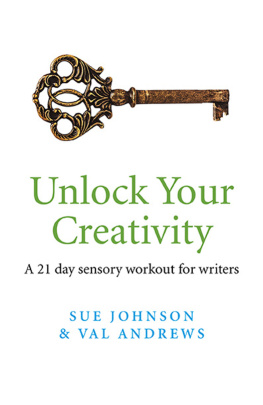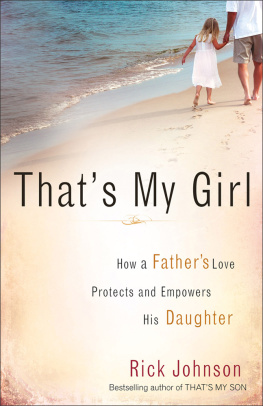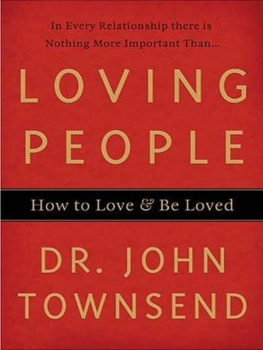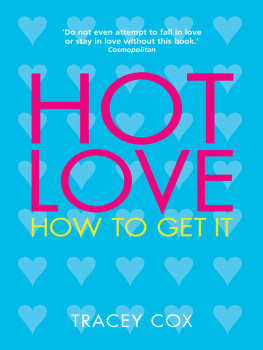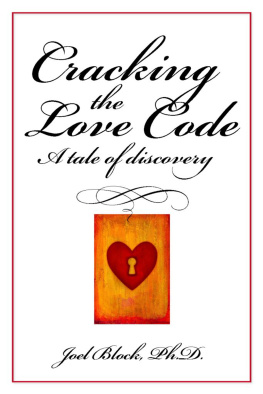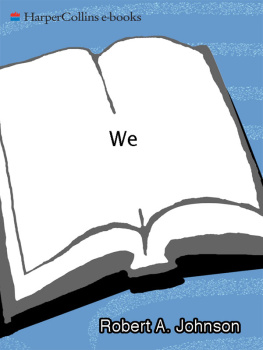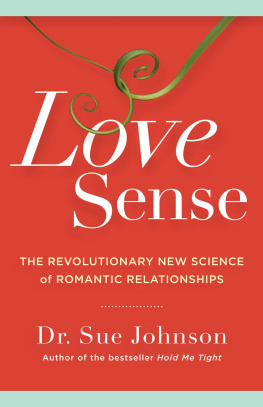In accordance with the U.S. Copyright Act of 1976, the scanning, uploading, and electronic sharing of any part of this book without the permission of the publisher constitute unlawful piracy and theft of the authors intellectual property. If you would like to use material from the book (other than for review purposes), prior written permission must be obtained by contacting the publisher at permissions@hbgusa.com. Thank you for your support of the authors rights.
Also, this book is dedicated to those I lovethose who continually offer me a safe haven and a secure base from which to joyfully leap into the unknown. You know who you are.
People think love is an emotion. Love is good sense.
Unless you love someone, nothing else makes any sense.
e. e. cummings
W e are obsessed with love and love relationships. But what do we really know about love? We instinctively know that there is no other experience that will have more impact on our livesour happiness and healththan our success at loving and being loved. We know that love makes us vulnerable, but also that we are never as safe and strong as when we are sure we are loved. We know that at the most difficult moments in our lives, nothing but the comfort of the ones we love will do. But although, at the end of the first decade of the 21st century, our species has smarts enough to split the atom and soar into space, we still seem to have no clear or rigorous understanding of the intense connection that is so central to our being.
The consensus across human history is that romantic love is, and always will be, an enigma, somehow by its very nature unknowable. I am reminded of Palamon, the imprisoned knight in Chaucers 14th-century Canterbury Tales, who, through his barred window, spies the fair Emily gathering flowers and singing. He cries out in pain and explains to his cousin and fellow prisoner Arcita:
Its not our prison that caused me to cry.
But I was wounded lately through the eye
Down to my heart, and that my bane will be.
The beauty of the lady that I see
There in that garden, pacing to and fro,
Is cause of all my crying and my woe.
I know not if shes woman or goddess;
But Venus she is verily, I guess.
Love, to so many of us, seems a bewitchmenta force, powerful and dangerous, that strikes us without our bidding.
Perhaps because love seems so baffling and unruly, we appear to be losing all faith in the viability of stable, romantic partnerships. Pessimism is rampant. On any given day, we scan press accounts and catch videos on TV of famous folks caught in adulterous affairs. We check online advice blogs extolling swinging as the way to combat inevitable relationship fatigue, and read op-ed pieces maintaining that monogamy is an antiquated and impossible concept that should be junked. When it comes to adult love, we appear to be truly lost.
All this at a time when, ironically, romantic love is more important than ever. A tsunami of loneliness, anxiety, and depression is sweeping through Western societies. Today, adult partnerships are often the only real human ties we can count on in our mobile and insanely multitasking world. My grandmother lived in a village of three hundred people that offered her a web of companionship and support, but now most of us seem, if we are lucky, to live in a community of two. Seeking and holding onto a life partner has become a pressing organizing feature of our lives, given that other community ties are so marginalized. The evidence is that we are ever more dependent on our mates for emotional connection and support while being in the dark as to how to create love and keep it.
Moreover, we seem in so many ways to be working actively against our desire for love and commitment. Our society exalts emotional independence. We are constantly exhorted to love ourselves first and foremost. A friend at a social gathering recently commented to me, Even you have to face it. We are in general a distant and dismissive society. People dont believe in love relationships anymore. They are not the priority. No one has time for them anyway.
As a clinical psychologist, couple therapist, and relationship researcher, I have grown increasingly alarmed and frustrated by where we are and where we seem to be going. Through my own work and that of esteemed colleagues, I know that the cynicism and hopelessness are misplaced. Today, we have a revolutionary new perspective on romantic love, one that is optimistic and practical. Grounded in science, it reveals that love is vital to our existence. And far from being unfathomable, love is exquisitely logical and understandable. Whats more, it is adaptive and functional. Even better, it is malleable, repairable, and durable. In short, we now comprehend, finally and irrefutably, that love makes sense. The word derives from the Latin sentire, meaning to perceive, feel, or know, and also to find ones way. And that is why I have called this book Love Sense. I intend for it to help you find your way to more fulfilling and lasting love.
In Love Sense, you will learn what I and other scientists have discovered from thirty years of clinical studies, laboratory experiments, and applied therapies. You will learn that love is a basic survival code, that an essential task of our mammalian brain is to read and respond to others, and that it is being able to depend on others that makes us strong. You will learn that rejection and abandonment are danger cues that plunge us into real physical pain, that sexual infatuation and novelty are overrated, and that even the most distressed couples can repair their bond if they are guided to deal with their emotions a little differently.
My particular contribution lies in relationship repair. Working with thousands of despairing couples through the years has led me to create a new systematic model of treatment, Emotionally Focused Therapy, that honors our need for connection and support. EFT, as it is commonly called, is the most successful approach to healing faltering relationships that has yet been devised, with an astounding 7075 percent success rate. Today, EFT is routinely taught to counselors in training in at least twenty-five countries around the globe. A simplified version of EFT for couples wishing to help themselves can be found in my previous book Hold Me Tight: Seven Conversations for a Lifetime of Love.
These are but a few results of the scientific quest to understand love. In the pages of this book, you will find the results of many more studies as well as the stories of many couples in their most intimate moments. (All stories are composites of several cases and are simplified to reflect general truths. Names and details have been changed to protect privacy.) You will be surprised, and even stunned, at what you read but most of all you will be enlightened, not only as to the nature of love and how it affects us personally but also about what it means to us as human beings and to our society and the world. All the research agrees that a stable, loving relationship is the absolute cornerstone of human happiness and general well-being. A good relationship is better health insurance than a careful diet and a better anti-aging strategy than taking vitamins. A loving relationship also is the key to creating families that teach the skills necessary to maintain a civilized societytrust, empathy, and cooperation. Love is the lifeblood of our species and our world.


